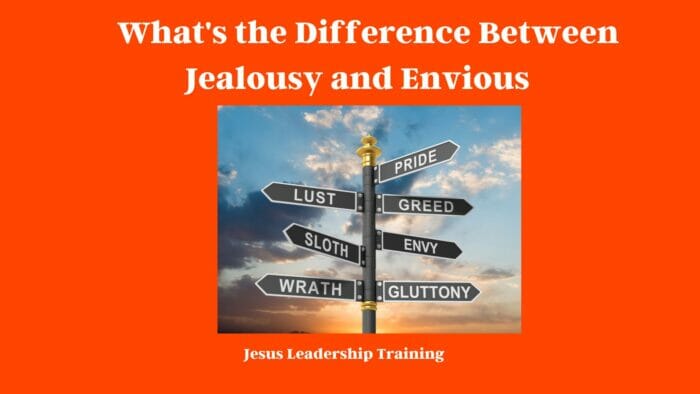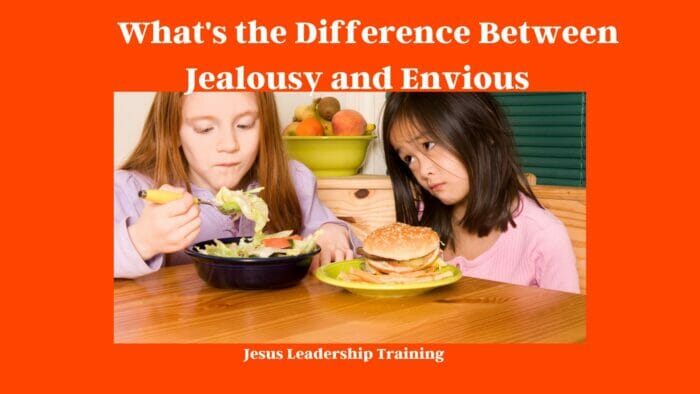Difference Between Jealousy and Envious – Jealousy is the fear of losing what one has, while envy is the desire to possess what someone else has. Jealousy is directed towards a person, while envy is directed towards an object or situation.
Jealousy and envy are two powerful emotions that are often confused with one another. While they are both related to feelings of insecurity and possessiveness, there are some key differences between them.
Jealousy is an emotion that is characterized by insecurity, fear of loss, and possessiveness, while envy is characterized by a feeling of discontentment or a longing for what someone else has. Jealousy is often triggered when someone is worried that a relationship or possession is being threatened, while envy is triggered when someone desires something that someone else has.
Table of Contents
Difference Between Jealousy and Envious
Jealousy and envy are two emotions that everyone has experienced at some point in their lives. They are often used interchangeably, but they are not the same thing. Jealousy and envy are complex emotions that can be difficult to understand, but learning to distinguish between them is crucial for managing them effectively.
Jealousy and envy can both arise from feelings of inadequacy, insecurity, and fear of loss. However, they differ in their triggers and effects. Jealousy is typically triggered by the perceived threat of losing something that one already possesses, such as a romantic partner, a friendship, or a job. On the other hand, envy is triggered by the desire to possess something that someone else has, such as wealth, status, or talent.
Understanding the difference between jealousy and envy is the first step in managing these emotions effectively. In this article, we will explore the distinctions between jealousy and envy, their causes, and how to overcome them.

Etymology of the Biblical Word Envy
In the Bible, the term “envy” is used to describe a range of negative emotions, including jealousy, rivalry, and resentment. But how did this word come to be so widely used? To understand the etymology of the word “envy”, we must look at its roots in the three main languages of the Bible: Hebrew, Greek, and Aramaic.
Origin
The word “envy” is derived from the Latin word invidiae, which translates to “ill-will” or “ill-feeling”. This Latin word was likely derived from the earlier Proto-Indo-European root “neid”, which translates to “to feel hostile”.
Hebrew
In the Hebrew Bible, the word “envy” is translated as qinah. This term has a strong sense of anger, hatred, and malice. It is used to describe the negative emotions experienced by someone who sees something they want which is possessed by someone else.
Greek
In the Greek Bible, the word “envy” is translated as phthonos. This term refers to the same negative emotions as qinah, but it also implies a sense of injustice. It conveys the idea that someone has been wronged by another person’s success or possession of something that they want.
Aramaic
In the Aramaic Bible, the word “envy” is translated as zann. This term is similar to the Hebrew and Greek terms in that it conveys the same range of negative emotions. However, it also contains a sense of desire, implying that someone wants something that is possessed by another person.
The various translations of the word “envy” in the Bible demonstrate the complex nature of this emotion. From its roots in the languages of the Bible, we can see that envy is a complex emotion that contains elements of anger, hatred, malice, injustice, and desire.

Differences Between Jealousy and Envy
To understand the differences between jealousy and envy, let’s look at their characteristics, triggers, and effects.
Jealousy and envy are two emotions that are often used interchangeably, but they are not the same thing. While they may be similar in some ways, there are distinct differences between the two. In this blog post, we will explore the differences between jealousy and envy, examine their consequences, and discuss ways to prevent the
Jealousy and envy are both emotions that are often associated with feelings of inadequacy, insecurity, and discontentment. While these emotions are common, they can also be very destructive if left unchecked. In this article, we will explore the differences between jealousy and envy, examine their consequences, and discuss ways to prevent them.
Etymology of the Biblical Word Jealousy
The etymology of the biblical word “jealousy” is an interesting topic to explore. Its origin can be traced back to its roots in Hebrew, Greek, and Aramaic.
Origin
The origin of the word “jealousy” can be traced back to the Hebrew qinah, which means “zeal” or “fervor”. In the Old Testament, it is often used to describe the passionate devotion of God’s people. This can be seen in passages such as Deuteronomy 4:24, “For the Lord thy God is a consuming fire, even a jealous God.”
Hebrew
The Greek word zelos is also related to jealousy. In the New Testament, it is used to describe the passionate desire of the Holy Spirit, as seen in Romans 11:29, “For the gifts and calling of God are without repentance.” It can also be used to describe the passionate devotion of Christians to their faith, as seen in Galatians 5:22, “The fruit of the Spirit is love, joy, peace, longsuffering, gentleness, goodness, faith, meekness, temperance: Against such there is no law.”
Greek
Finally, the Aramaic word qinah is also linked to jealousy. This is seen in the Aramaic translation of the Old Testament, the Targum, which uses this word to describe the passionate devotion of the Israelites. This can be seen in Exodus 20:5, “For I the Lord thy God am a jealous God, visiting the iniquity of the fathers upon the children unto the third and fourth generation of them that hate me.”
Aramaic
Overall, the etymology of the word “jealousy” can be traced back to its roots in Hebrew, Greek, and Aramaic. Through these languages, it has been used to describe the passionate devotion of God’s people, the gifts of the Holy Spirit, and the love of God.

Bible Characters Consumed with Envy and Jealousy
- King Saul: King Saul was consumed with envy and jealousy of David after the Lord chose David to be king instead of him. Saul was so jealous of David that he went to great lengths to try to kill him. He even tried to get his own son Jonathan to kill him.
- Joseph’s Brothers: Joseph’s brothers were so consumed with envy and jealousy over the fact that their father Jacob loved Joseph the most that they sold him into slavery.
- Absalom: Absalom was consumed with envy and jealousy of his father, King David. He conspired against his father and tried to usurp the throne.
- King Ahab: King Ahab was consumed with envy and jealousy of Naboth. Ahab wanted to take Naboth’s land, but Naboth refused to give it to him. So Ahab conspired to have Naboth killed in order to get the land.
- Herod: Herod was consumed with envy and jealousy of Jesus. He was so jealous of Jesus’ power that he ordered the murder of all the babies in Bethlehem in an attempt to kill Jesus.
- Judas Iscariot: Judas Iscariot was consumed with envy and jealousy of Jesus. He betrayed Jesus to the Romans in order to get money.
Exploring the Difference Between Jealousy and Envy
Jealousy and envy are two emotions that are often confused with each other. However, there are some key differences between the two. Jealousy is the feeling of being threatened by someone else’s success or possessions, while envy is the feeling of wanting something that someone else has.
Bible Characters that Overcame Envy and Jealousy
- Joseph: Joseph was the son of Jacob, who was wrongfully sold into slavery by his brothers out of envy. Despite his difficult situation, Joseph used his intelligence and faith in God to rise up and become the second most powerful man in Egypt. He was able to forgive his brothers and show mercy, demonstrating that he had overcome his own envy.
- David: David was anointed king of Israel despite the envy of his older brothers. He was able to show humility and mercy to King Saul, who was jealous of David’s success. He also demonstrated great courage and faith in God, which allowed him to overcome his own envy.
- Daniel: Daniel was a young Jewish man who was taken captive and placed in a foreign court. Despite the envy of his colleagues, he maintained his faith in God and was able to interpret the king’s dreams. He was also able to protect his people from the king’s wrath, demonstrating his courage and faith.
- Job: Job was a wealthy man who was tested by God and struck with tragedy. Despite the envy of his friends and the accusations that he had sinned, Job remained faithful to God and was rewarded for his faith. He was ultimately able to overcome his envy and remain loyal to God.
- Esther: Esther was a Jewish girl who was chosen to be the queen of Persia. Despite the envy of her enemies, she demonstrated great courage and faith in God, which helped her to save her people from destruction. She was able to overcome her own envy and act as an example of faith for others.
Distinguishing Between Jealous and Envious
Jealousy is often directed towards a person, while envy is directed towards an object or situation. For example, someone may be jealous of their partner’s attention towards someone else, while someone else may envy their neighbor’s new car.
What Does Jesus teach about Envy and Jealousy
In the teachings of Jesus, envy and jealousy are both seen as harmful emotions. Jesus teaches that we should not be envious of what others have, and that we should not be jealous of others’ successes.
In the Gospel of Matthew, Jesus teaches, “Do not lay up for yourselves treasures on earth, where moth and rust destroy and where thieves break in and steal, but lay up for yourselves treasures in heaven, where neither moth nor rust destroys and where thieves do not break in and steal. For where your treasure is, there your heart will be also” (Matthew 6:19-21).
This passage emphasizes the importance of focusing on eternal treasures, rather than worldly possessions. Jesus teaches that the pursuit of material wealth and success can lead to envy and jealousy, which can ultimately lead to a sense of emptiness and dissatisfaction.
In addition, Jesus teaches that we should love our neighbors as ourselves, and that we should not covet what others have. In the Gospel of Luke, Jesus says, “Take care, and be on your guard against all covetousness, for one’s life does not consist in the abundance of his possessions” (Luke 12:15).
This passage emphasizes the importance of contentment and gratitude, rather than envy and jealousy. Jesus teaches that our worth and value do not come from material possessions or worldly success, but from our relationship with God and our ability to love and serve others.
Overall, Jesus teaches that envy and jealousy are harmful emotions that can lead us away from God and toward a sense of dissatisfaction and discontentment. By focusing on eternal treasures, loving our neighbors, and cultivating a mindset of contentment and gratitude, we can overcome these negative emotions and live a fulfilling and joyful life in Christ.
Examining the Confused Words: Jealousy and Envy
Jealousy and envy are often used interchangeably, but they are not the same thing. Jealousy is often associated with possessiveness, while envy is associated with a desire for something that someone else has. Jealousy is often directed toward a person, while envy is directed toward an object or situation.
How to Find the Difference Between Jealousy and Envy
One way to distinguish between jealousy and envy is to examine the emotion behind it. Jealousy is often rooted in fear, while envy is rooted in desire. Jealousy is often a reaction to a perceived threat, while envy is a desire for something that someone else has.
How satan Displayed Envy and Jealousy
- The envy of Satan is mentioned in the book of Job, when God asks Satan why he is roaming the earth and Satan responds: “From going to and fro in the earth, and from walking up and down in it.” (Job 1:7) Here, Satan is expressing his envy of mankind, wishing to be able to roam freely like them.
- Satan is also jealous of God’s love for mankind, as seen in the book of Isaiah: “How you are fallen from heaven, O Lucifer, son of the morning! How you are cut down to the ground, You who weakened the nations! For you have said in your heart: ‘I will ascend into heaven, I will exalt my throne above the stars of God; I will also sit on the mount of the congregation on the farthest sides of the north; I will ascend above the heights of the clouds, I will be like the Most High.” (Isaiah 14:12-14) Here, Satan’s envy and jealousy of God’s love for mankind is apparent, as he desires to be like the Most High.
- Satan also expresses envy and jealousy of Jesus Christ’s power in the book of Matthew: “Then Jesus said to him, ‘Away with you, Satan! For it is written, ‘You shall worship the Lord your God, and Him only you shall serve.’” (Matthew 4:10) Here, Satan is envious of Jesus’ power, as he desires to be worshipped instead of God.
- Furthermore, Satan is jealous of mankind’s relationship with God, as seen in the book of Genesis: “Now the serpent was more cunning than any beast of the field which the Lord God had made. And he said to the woman, ‘Has God indeed said, ‘You shall not eat of every tree of the garden?’” (Genesis 3:1) Here, Satan is jealous of the close relationship between God and mankind, and attempts to drive a wedge between them.
- Finally, Satan is envious of the forgiveness that God offers to mankind, as seen in the book of Luke: “Now when the unclean spirit goes out of a man, it passes through waterless places seeking rest, and finds none. Then it says, ‘I will return to my house from which I came.’ And when it comes, it finds it empty, swept, and put in order. Then it goes and takes with it seven other spirits more wicked than itself, and they enter and dwell there; and the last state of that man is worse than the first.” (Luke 11:24-26) Here, Satan is envious of God’s mercy and grace, which is offered to mankind despite their sins.
Understanding the Impact of Jealousy and Envy
Jealousy and envy can have a significant impact on our lives, both emotionally and physically. They can cause us to feel unhappy, stressed, and anxious. In extreme cases, jealousy and envy can even lead to violence and other destructive behavior.
Uncovering the Consequences of Jealousy and Envy
Jealousy and envy can have negative consequences on our relationships, our mental health, and our overall well-being. They can lead to feelings of resentment, bitterness, and anger. They can also cause us to become overly competitive and aggressive.
God Feels About Jealousy and Envy
In the Bible, jealousy and envy are both described as negative emotions. However, there are some instances where jealousy is seen as a positive thing. For example, God is described as being jealous for his people’s love and devotion.
Jesus Teaches About Jealousy and Envy
In the teachings of Jesus, jealousy and envy are both seen as harmful emotions. Jesus teaches that we should not be envious of what others have, and that we should not be jealous of others’ successes.
How to Prevent Jealousy and Envy
Preventing jealousy and envy requires a conscious effort to focus on the positive aspects of our lives. We can cultivate gratitude and contentment by focusing on what we have, rather than what we lack. We can also practice empathy and compassion, which can help us to feel less threatened by others’ successes.
Pros and Cons of Jealousy and Envy
Jealousy and envy both have their pros and cons. Jealousy can motivate us to work harder and achieve more, while envy can
Jealousy can also be a sign of love and commitment in relationships. It can show that we care deeply about our partner and are invested in the relationship. However, jealousy can also lead to possessiveness and control, which can be harmful to the relationship.
Envy can also have its benefits. It can motivate us to work harder and strive for success. It can also help us to identify our goals and desires. However, envy can also lead to feelings of dissatisfaction and discontentment, which can be detrimental to our overall well-being.
Repent of Jealousy and Envy
Repenting of jealousy and envy requires acknowledging the negative impact that these emotions have on our lives and relationships. It also requires taking responsibility for our actions and making a conscious effort to change our thoughts and behaviors.
Comparing Jealousy and Envy
Jealousy and envy are often compared to each other, but they are different emotions with different causes and consequences. While jealousy is often rooted in fear and possessiveness, envy is often rooted in desire and longing.
Discovering the Causes of Jealousy and Envy
Jealousy and envy can be caused by a variety of factors, including low self-esteem, feelings of inadequacy, and a lack of self-worth. They can also be influenced by societal and cultural pressures to succeed and achieve.
Exploring the Contrasts Between Jealousy and Envy
While jealousy and envy are often compared to each other, they have distinct differences that should be recognized. Jealousy is often directed towards a person, while envy is directed towards an object or situation. Jealousy is often a reaction to a perceived threat, while envy is a desire for something that someone else has.
Characteristics of Jealousy
- Jealousy is a complex emotion that includes feelings of anger, fear, and sadness.
- Jealousy is often accompanied by physical sensations such as increased heart rate, sweating, and trembling.
- Jealousy can lead to behaviors such as possessiveness, suspicion, and aggression.
- Jealousy is usually triggered by the perceived threat of losing something that one already possesses, such as a romantic partner, a friendship, or a job.
Negative Consequences of Jealousy
- Damage to relationships: Jealousy can lead to arguments, resentment and mistrust, which can damage relationships with friends, family and romantic partners.
- Anxiety: Jealousy can lead to feelings of anxiety and fear that can negatively impact your feelings of self-worth.
- Depression: Jealousy can lead to feelings of depression and hopelessness, which can eventually spiral into more serious mental health issues.
- Insecurity: Jealousy can make you feel insecure and paranoid, causing you to doubt yourself and your abilities.
- Loss of productivity: Jealousy can consume your thoughts and energy, making it hard to focus on tasks or be productive.
- Isolation: Jealousy can cause you to withdraw from social situations and isolate yourself, which can lead to further feelings of loneliness and depression.
- Poor decision making: Jealousy can lead to rash decisions and impulsive behavior that can have long-term consequences.
- Stress: Jealousy can cause stress and worry, leading to physical symptoms such as headaches, stomachaches and insomnia.
- Inability to trust: Jealousy can lead to an inability to trust or have faith in others, which can make it difficult to form meaningful relationships.
- Unhealthy comparisons: Jealousy can make you compare yourself to others, which can lead to feelings of inadequacy and low self-esteem.
List of the Ways to Biblically Avoid Envy
- Pray for the Lord to help overcome envy (James 4:6). Ask God to fill you with His love, peace, and joy so that envy can be replaced with contentment.
- Meditate on the Bible and focus on Scripture that warns against envy (Proverbs 14:30; 24:1-2). Be mindful of what the Bible says about envy and how it can lead to destruction.
- Thank God for the gifts He has given you (1 Thessalonians 5:18). Celebrate your own gifts and be thankful for them, instead of focusing on what others have.
- Spend time with friends who are positive and encouraging (Proverbs 17:17). Avoid spending time with people who are jealous or envious.
- Focus on what you can do to make a difference in the world (Galatians 6:9-10). Instead of comparing yourself to others, focus on what you can do to make a difference.
- Spend time helping those in need (Galatians 2:10). Serving others can help to put your own problems into perspective.
- Practice self-control (Galatians 5:22-23). Learn to control your thoughts and feelings, so that you can avoid feelings of envy.
- Spend time in nature (Psalm 19:1-2). Enjoying the beauty of nature can help to put our own problems into perspective.
- Seek out wise counsel (Proverbs 11:14). Talking to a mentor or a trusted friend can help to talk through the feelings of envy and work out a plan for overcoming it.
Characteristics of Envy
- Envy is a desire to possess something that someone else has.
- Envy is usually accompanied by feelings of inferiority, resentment, and bitterness.
- Envy can lead to behaviors such as competition, criticism, and sabotage.
- Envy is usually triggered by the desire to possess something that someone else has, such as wealth, status, or talent.
Managing Jealousy
- Recognize and acknowledge your feelings of jealousy.
- Identify the root cause of your jealousy.
- Communicate openly and honestly with the person who triggered your jealousy.
- Focus on your own strengths and accomplishments.
- Practice self-care, such as exercise, meditation, or therapy.
Managing Envy
- Recognize and acknowledge your feelings of envy.
- Identify the underlying insecurity or fear that is driving your envy.
- Reframe your thinking to focus on your own goals and achievements.
- Practice gratitude by focusing on the good things in your life.
- Avoid comparing yourself to others and instead focus on your own progress and growth.
Final Thoughts – Difference Between Jealousy and Envious
Jealousy and envy are two emotions that can have a significant impact on our lives and relationships. While they may be similar in some ways, they are not the same thing. It is important to recognize the differences between jealousy and envy and to take steps to prevent them from controlling our lives.
By focusing on gratitude, empathy, and compassion, we can cultivate a mindset of contentment and positivity. We can also recognize the negative impact that jealousy and envy can have on our lives and relationships and take steps to prevent them from causing harm.
FAQs
Can jealousy and envy be positive emotions?
While jealousy and envy can motivate us to achieve our goals, they can also have negative consequences if left unchecked.
Is jealousy or envy more harmful?
Both jealousy and envy can have harmful consequences if left unchecked. It is important to recognize the differences between the two and to take steps to prevent them from causing harm.
Can jealousy and envy be overcome?
Yes, jealousy and envy can be overcome by cultivating a mindset of gratitude, empathy, and compassion. It may also require seeking professional help to address underlying issues.
How can I prevent jealousy and envy in my relationships?
Preventing jealousy and envy in relationships requires open communication, trust, and a willingness to work together to overcome any issues that arise.
Is it possible to be jealous and envious at the same time?
Yes, it is possible to experience both jealousy and envy at the same time. However, it is important to recognize the differences between the two and to take steps to prevent them from causing harm in our lives and relationships.




